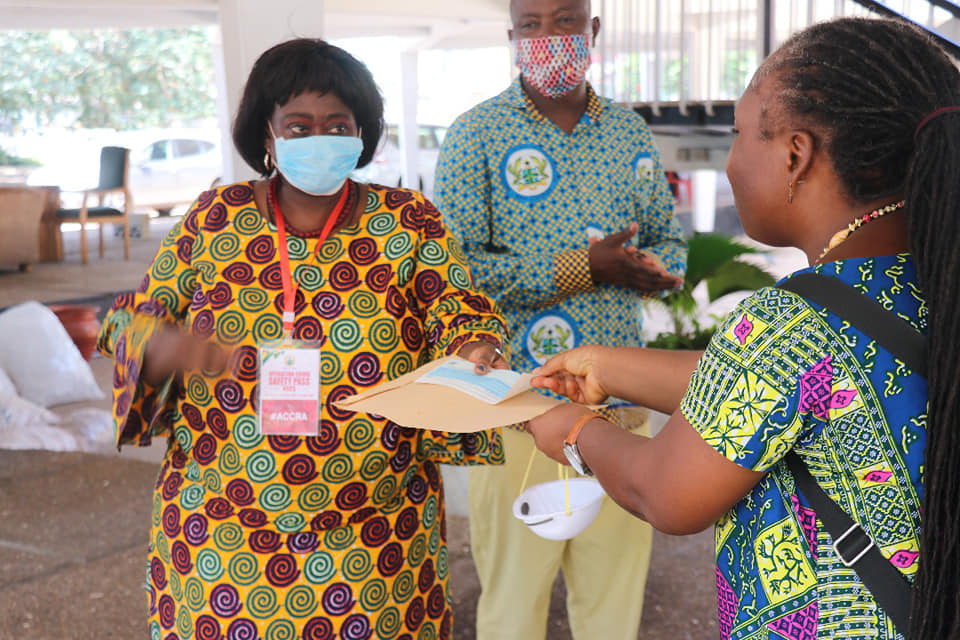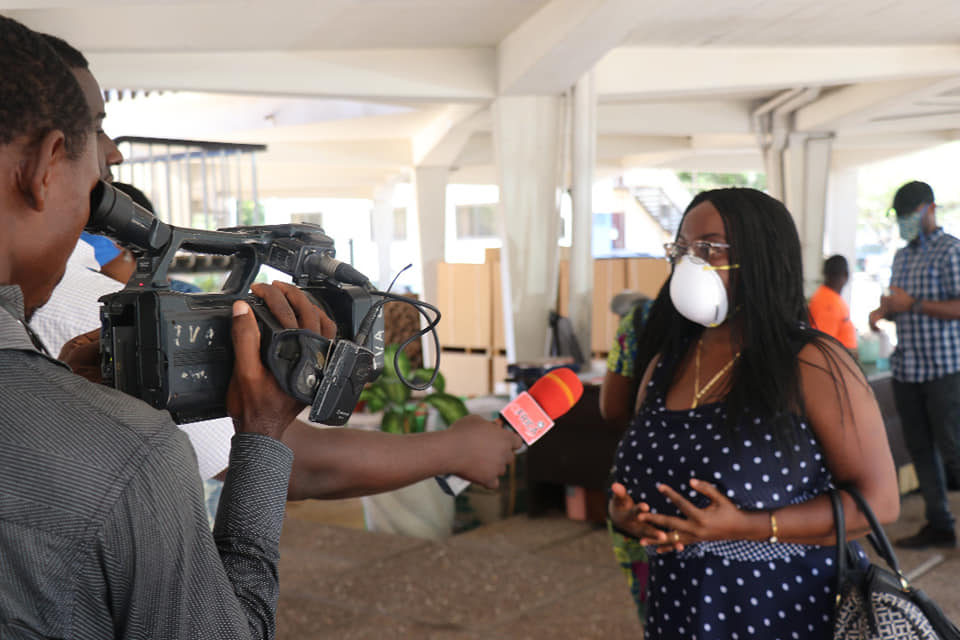Written by Patricia Akakpo
Diploma in Development Leadership, 2015
Practice, Adaptations, Innovations
In the wake of the COVID-19 global pandemic, governments across the world are putting in place measures to end the pandemic by instituting or intensifying social protection programmes and directives to address the crisis. However, most of the measures are ‘business as usual’ thus, devoid of active citizen engagement to ensure that strategies developed are specific to addressing the fallouts of COVID-19. It is worthy to acknowledge Ghana’s efforts in addressing the pandemic through the institution of measures such as a ban on public gathering and events as well as a partial lockdown, social distancing, and hygienic practices, including enacting the Imposition of Restrictions Act 2020 (Act 1012) and the Establishment of Emergency Communications System Instrument, 2020 (EI 63).
One key concern is the lack of clarity on constitutional decisions justifying the passage of these Acts, due to its potential to breed unnecessary constitutional challenges, and its potential arbitrary implementation. A new Law grants unnecessary powers to the president, though legal opinions are that existing legal provisions are adequate to deal with the matters to be purportedly addressed by this new Law. Legal experts have challenged certain aspects of the Law that gives the president powers to issue several executive instruments (EIs) outlining measures to contain COVID-19 [1]. There are concerns the new Law may be abused, including potential infringements on the fundamental rights and freedoms of the people of Ghana [2].
Government has engaged groups such as traditional and religious leaders as well as labour, but this engagement has not been sufficiently broad or inclusive to ensure the voice and concerns of a majority of people – such as women, vulnerable groups and communities – are reflected in the measures being taken. As a result, measures such as social distancing and self-quarantining have not taken into account the largely informal nature of the Ghanaian economy, the predominance of self-employment, communal living conditions, public transportation, and the nature of our markets.
To adhere to government directives, the Network of Women’s Rights in Ghana (NETRIGHT) and its member organisations have put public engagements on hold. However, we have explored other approaches to reach out to communities we work with, most of which are virtual engagements. The key challenge is ensuring inclusion and broader engagement in policy spaces, since a majority of the people are unable to engage virtually given their location and/or situation.
So far, as a national women’s rights network, NETRIGHT has issued two statements calling on the government to ensure COVID-19 interventions are responsive to the needs of the poor, including homeless women and the vulnerable in society [3]. Also, NETRIGHT mobilised funds among women groups which has been donated to the Ministry of Gender, Children and Social Protection (MoGCSP) to support its efforts in reaching out to vulnerable and homeless women and children [4].

NETRIGHT makes a donation to the Ministry of Gender, Children and Social Protection

Photos: NETRIGHT Facebook
NETRIGHT members are also involved in community engagement on COVID-19. For instance, the Savannah Women Integrated Development Agency (SWIDA-GH) is carrying out community sensitisation and distributing relief items to deprived communities in the Northern Region of Ghana as part of efforts to reach out to communities during this period [5]. SWIDA-GH is a beneficiary of NETRIGHT’s African Women’s Development Fund – Leading from the South (AWDF LFS) funded project on strengthening the voice of women farmers for improved livelihoods, which seeks to build the capacity of women’s rights organizations (WRO), and community-based organizations (CBO) working with women farmers and women farmers’ groups.
The Rights and Responsibilities Initiative (RRIG) meanwhile is creating public awareness and encouraging women and girls to report cases of sexual and gender-based violence (SGBV) during this period when people are spending more time at home [6].
While the pandemic poses threats to all citizens of Ghana, it is critical that the measures taken guarantee the human rights of all people within the country. A majority of the people experience poverty, reside in deprived urban and rural communities, and/or are living with disabilities, and thus are already facing challenges in accessing effective and efficient healthcare. While ensuring that other critical healthcare needs are given attention, it is also important that access to healthcare be expanded for the marginalised and most vulnerable to the virus. Currently, there is an outbreak of Cerebrospinal Meningitis (CSM) in the northern part of Ghana with a death toll higher than COVID-19 recorded deaths; however, not much attention has been given to this outbreak.
The Government has announced stimulus packages for small and medium enterprises (SMEs); however, there is no clarity on modalities for the package. Thus, it is difficult to ascertain how for example, female-owned SMEs including market women and female farmers, will be able to access the package.
Government is yet to define which groups of workers constitute frontline workers to enable them to benefit from a stimulus package for this category. Women constitute the majority of primary caregivers for family members, as well as in professional capacities as health and social workers. At the same time, they face increased burden to provide for their family, particularly if family members fall ill or lose jobs due to the economic hardship linked to the pandemic. It is therefore the responsibility of the government to take steps to stabilize prices and counter inflation in the face of price-hiking. With the lifting of the partial lockdown and schools still closed as of May 8, working mothers are disproportionately burdened with childcare responsibilities. There is a need for working mothers to be assisted with childcare, while ensuring that both women and men receive some protection from the economic impacts of the pandemic on an equal basis.
In the midst of the pandemic and its fallout, CSOs that have historically championed citizen engagement through their work and facilitated entry points for community voice have been on the fringes, as their activities have been curtailed as a result of government directives to curb the virus. Notwithstanding, CSOs are creating their own spaces in the COVID-19 response by building synergies on joint civil society actions to combat COVID-19, and by working together to demand for equity, accountability and transparency in the management of the National Fund set up for COVID-19 as well as other government actions during this period.
Reflections, Learning and Lessons
The sharing of experiences and situational analysis in the wake of COVID-19 can serve as a peer learning mechanism, and learnings will contribute to reshaping our thinking and approach as well as explore new innovative ideas to enhance inclusive participation to effect change.
I have had learnings around work practices and how these can be easily adapted to respond to emerging issues, which is critical. Thus, issues such as flexible working hours, workplace childcare facilities, our capacity to respond to emergency situations and meeting the needs of the communities we work with, while adhering to protocols to curb the pandemic are concerns that we are still thinking through as a leading network advancing the rights of women.
The handling of the pandemic is ‘business as usual’ with limited citizen engagement; however, citizens continue to question duty bearers on their actions and inactions during this period and to demand accountability. Even though there are directives which are hindering effective engagement in governance processes, other strategies are being adopted mainly through traditional and social media, and new ICT apps that are supporting virtual engagement.
As a feminist, shared leadership continues to be the effective leadership style in this pandemic. Our ability to work together as a collective, diversify our resources while building synergies will greatly contribute to achieving success in our efforts to promote citizens’ participation in democratic governance.
How do we move beyond government’s rhetoric to getting duty bearers and policymakers to actualise their commitments to promote the fundamental human rights of the people, address the increased inequalities and social injustices, while promoting inclusion, gender equality and democratic governance?

Patricia Akakpo is the Program Manager for the Network of Women’s Rights in Ghana (NETRIGHT). She holds a BA in Political Science with Philosophy from the University of Ghana and a Master’s of Development Studies (Gender Studies and Human Resource Employment) from the International Institute of Social Studies (ISS) of Erasmus University Rotterdam. She holds a Diploma in Development Leadership from Coady International Institute, where she received the 2015 Katherine Fleming International Development Award.
Notes
[4] (https://t.co/hQYYPDBFQg; https://twitter.com/GHANANEWSAGENCY/status/1249038512554467332?s=20; https://www.gna.org.gh/1.17858602
[5] https://www.facebook.com/109996793808039/posts/164194868388231/; https://www.facebook.com/109996793808039/posts/166073801533671/; https://thecustodianghonline.com/hajia-sagito-advocates-women-empowerment-in-fighting-covid-19/
[6] https://newsghana.com.gh/be-bold-to-report-any-abuse-during-the-lockdown-aba-oppong/).
We are pleased to partner with Participedia – a crowdsourcing platform for researchers, activists, practitioners, and anyone interested in public participation and democratic innovations.
Browse the Coady Institute Graduates Collection on Participedia
Browse the Citizens Voices & Values on COVID-19 Collection Particpedia